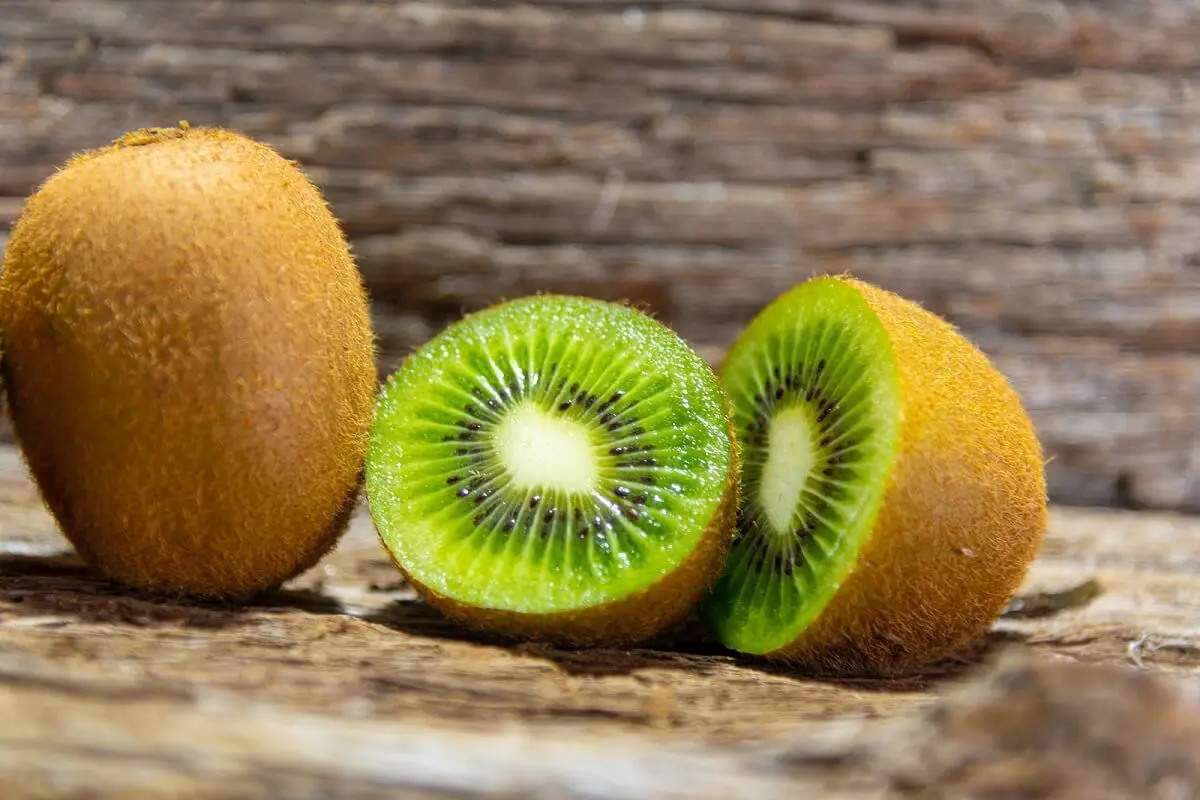What Are the Benefits of Kiwifruit for the Skin?


Reviewed and approved by the doctor Leonardo Biolatto
There are numerous benefits of kiwifruit and several of them have to do with skin health. This fruit has a large amount of vitamins, minerals, and other substances with excellent properties to maintain a healthy complexion.
A good part of the benefits of kiwifruit derive from its great richness in vitamin C. However, that isn’t all. It also has anti-inflammatory and antioxidant components.
Best of all, this fruit has a very pleasant taste. In addition, it’s one of the foods that tops the nutrition density charts. This means that it contains a high amount of nutrients per gram.
The properties of kiwifruit
Kiwifruit is an exotic fruit that comes from northern China. It’s also known as Chinese gooseberry.
It has a brown cover with small hairs, and is a deep green color inside. Its aroma and flavor are very pleasant.
Before we talk about the benefits of kiwifruit for the skin, let’s look at some of its many other health benefits:
- Provides vitamin K.
- Boosts the immune system.
- Contributes to good digestion.
- Helps to reduce cholesterol levels in the blood.
- It complements the diet during pregnancy, due to its high folic acid content.
Get to know more here: The Differences Between the Green and Yellow Kiwifruit
Benefits of kiwi for the skin
Kiwifruit has many benefits. A study conducted in 2013 showed that this fruit has antioxidant and anti-inflammatory properties. Therefore, it helps to have healthier skin and prevents aging.
It also has several of the most important nutrients for healthy skin:
- Vitamin C: Limits skin damage caused by the sun’s rays. It also promotes collagen formation and prevents skin blemishes.
- Vitamin E: Reduces sun damage and fights oxidative stress, as indicated by a 2018 study.
- Polyphenols: Kiwifruit contains epigallocatechin gallate (EGCG), a polyphenol that protects against oxidative stress and would be effective in preventing skin cancer.
- Lutein and zeaxanthin: These are two antioxidant substances that help prevent skin blemishes. They protect against the negative effects of sunlight.

Specific benefits
In addition to the above, research conducted in 2009 indicated that another benefit of kiwifruit for the skin is to help treat the symptoms of eczema. This condition causes red patches and itching.
Other benefits include the following:
- Helps reduce acne: This is due to its high vitamin C content.
- Prevents and fights wrinkles: Kiwifruit is full of antioxidants and these help counteract free radicals.
- Skin lightening: Another benefit of kiwifruit is that it protects the skin from the sun’s rays.
- Tissue repair: This fruit helps repair tissues after an injury, thanks to its high potassium content.
- Hair growth: The high vitamin E content is ideal for promoting hair growth. It also strengthens the scalp and prevents hair loss.
Read also: Discover 9 Secret Health Benefits of Kiwi
Possible risks
The only known risk to kiwifruit is the possibility of an allergic reaction. Some people are allergic to an enzyme present in this fruit, known as actinidin or actinidain. It’s also found in pineapple and papaya.
Most commonly, a person allergic to kiwifruit will develop rashes and hives after contact with the fruit. In severe cases, anaphylaxis may occur. Therefore, if someone notices any strange reaction when consuming the fruit, they should stop eating it immediately.
Kiwifruit isn’t recommended for people with kidney stones or renal insufficiency, due to its high potassium content. Any adverse reaction should be consulted with the doctor.

Final tips and recommendations
There is little or no evidence that the benefits of kiwi can be obtained by applying the fruit directly on the skin.
However, this fruit is part of several face masks. It’s combined with natural yogurt and oatmeal to form a paste and applied to the face. You normally keep it on for 10 minutes to reap its benefits.
In theory, this gives greater firmness to the skin and stimulates the production of collagen. It can also be applied to the scalp.
It’s believed that the greatest benefits of kiwifruit for the skin are obtained from direct consumption of the fruit, as part of a balanced diet. It’s possible that some cosmetic products made from kiwifruit are also effective, but there’s no scientific evidence to support this claim.
All cited sources were thoroughly reviewed by our team to ensure their quality, reliability, currency, and validity. The bibliography of this article was considered reliable and of academic or scientific accuracy.
- Stonehouse W, Gammon CS, Beck KL, Conlon CA, von Hurst PR, Kruger R. Kiwifruit: our daily prescription for health. Can J Physiol Pharmacol. 2013 Jun;91(6):442-7. doi: 10.1139/cjpp-2012-0303. Epub 2013 May 15. PMID: 23746068.
- Souyoul SA, Saussy KP, Lupo MP. Nutraceuticals: A Review. Dermatol Ther (Heidelb). 2018 Mar;8(1):5-16. doi: 10.1007/s13555-018-0221-x. Epub 2018 Feb 6. PMID: 29411317; PMCID: PMC5825326.
- Díaz Flores, J. (2009). Optimización de extracción y análisis de la capacidad antioxidante de la piel de kiwi.
This text is provided for informational purposes only and does not replace consultation with a professional. If in doubt, consult your specialist.








